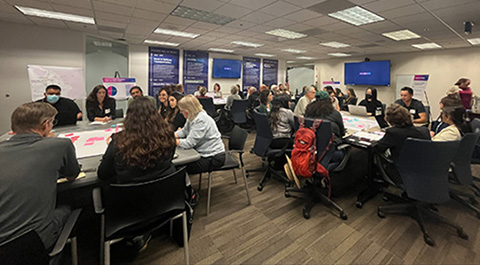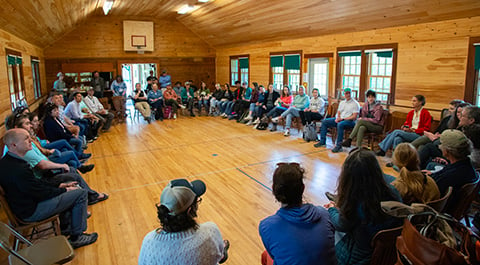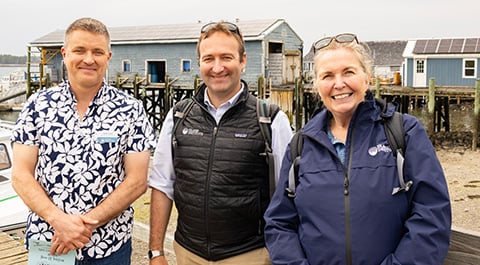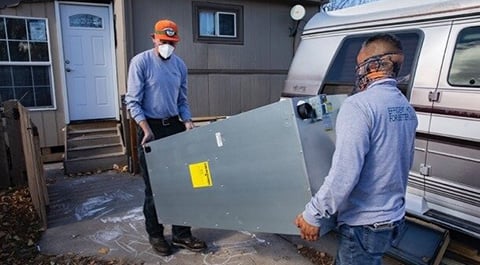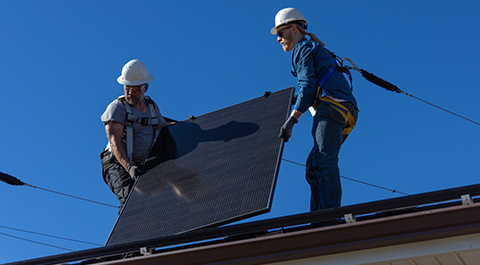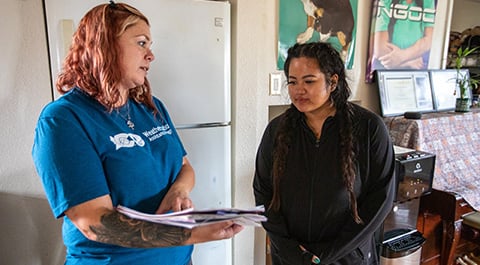Supporting the Development of Efficient, Affordable, and Resilient Energy Systems
Program Overview
In FY 2024, NREL's State, Local, and Tribal Program collaborated with more than 546 states, local jurisdictions, Tribes, and communities to support them in making informed energy transition decisions.
With broad support from the U.S. Department of Energy (DOE), and leveraging knowledge from local partners and stakeholders, NREL meets communities where they are. NREL provides energy expertise and solutions to develop efficient, affordable, equitable, and resilient energy systems that address local priorities and challenges. This work includes economic and workforce development, infrastructure planning, energy justice, and climate change.
Success Stories and Community Highlights
Leveraging interdisciplinary expertise and NREL's world-class analysis capabilities and suite of modeling tools—such as ARIES, ResStock™, REopt®, and the State and Local Planning for Energy (SLOPE) Platform—NREL's State, Local, and Tribal Program applies an equitable, holistic, systems thinking approach to tackle the most complex local energy challenges to deliver real results in real communities.
NREL News
Communities in Hawaii and Alaska Exchange Ideas To Engage Residents in Energy Transitions
Through the Energy Transitions Initiative Partnership Project (ETIPP), Sitka, Alaska, worked with Molokai, Hawaii, to learn best practices for engaging community members in building a strategic energy plan.
Electric Vehicles Grow in the Desert: Peer Learning Helps Sedona Plan for Charging Infrastructure
The city of Sedona, Arizona, found new ways to build its electric vehicle charging capacity through participation in DOE's Clean Energy to Communities (C2C) peer-learning cohorts.
Peer Learning Helps San Diego Center Community Voices in Clean Energy Plans
Looking to enhance community participation and build capacity within its organization, the San Diego Association of Governments joined a C2C peer-learning cohort focused on integrating community voices into clean energy planning and development.
Two Communities Find Electric Vehicle Options That Meet Local Goals Through Clean Energy to Communities
Washtenaw County, Michigan, and New Haven, Connecticut, explored how electric vehicles can support their communities' clean energy goals with expert analysis from researchers at NREL and Argonne National Laboratory.
SLOPE Illustrates Opportunities in Philadelphia's Equitable Carbon Neutrality Quest
The city of Philadelphia has pledged carbon neutrality by 2050. Philadelphia used the SLOPE Platform to illustrate opportunities to alleviate energy poverty and bring benefits to areas most in need.
SLOPE Informs Decarbonization Goal Setting in Will County, Illinois
Will County, Illinois, leveraged the SLOPE Platform to explore potential investment in a cleaner vehicle fleet, to expand renewable energy generation, and to engage the wider community in its efforts.
Perspective Pivot: Mapping a Landscape of Voices in Oahu Changes Energy Planning
Through ETIPP, Oahu, Hawaii, explored microgrid technology to meet local energy resilience priorities—from every-day reliability and access to emergency and disaster response.
Resilience at the Edge: City of Eastport Considers Harnessing Tidal Power for Island Microgrid
Researchers at NREL and Lawrence Berkeley National Laboratory worked with Eastport, Maine, to explore microgrid options for the bridged island at the easternmost point in the continental United States through ETIPP.
Zooming in on Electric Vehicles: How Duluth, Minnesota, Is Preparing for the EV Future
NREL researchers stepped up to the challenge to collaborate with a community in Duluth, Minnesota, to expand its local electric vehicle infrastructure.
YouTube
Washington Tribes in the Energy Transitions Initiative Partnership Project Gather for Solar Training
Spark Northwest, a regional partner organization for ETIPP, brought together members of the Nooksack, Port Gamble S'Klallam, and Makah Tribes for a solar energy training.
Technical Assistance Program Highlights
Clean Energy to Communities
NREL continued to support clean energy progress in more than 200 communities through DOE's Clean Energy to Communities (C2C) program. C2C provides communities with expertise and tools to achieve their renewable energy and grid, transportation, buildings, and resilience goals through three unique offerings.
Communities LEAP
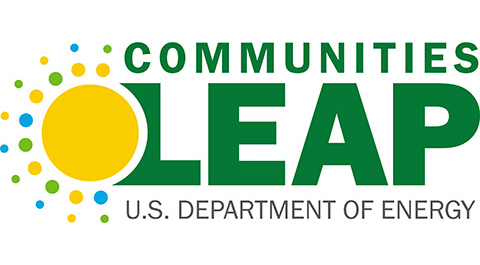
As part of the Communities LEAP (Local Energy Action Program), NREL partnered with 22 of the 24 pilot communities to provide tailored technical assistance. NREL supported the communities with coalition building, comprising government entities, community-based organizations, utilities, residents, and more. The community coalitions then worked with NREL to determine pathways for a clean energy future, resulting in custom technical assistance spanning analysis and modeling, strategic planning, community engagement, and workforce development. NREL also developed more than 150 presentations, technical reports, fact sheets, and other products to help communities apply for new funding and technical assistance opportunities.
Energy Transitions Initiative Partnership Project
ETIPP expanded its support to 57 total island, coastal, and remote communities across the United States and its territories in FY 2024. The 12- to 18-month DOE program—which is managed by NREL and follows community-led initiatives to build energy resilience—began offering up to $50,000 in direct funding to participating communities. The program also offered an energy planning technical assistance track in addition to in-kind modeling and analysis from researchers at NREL, Lawrence Berkeley National Laboratory, Pacific Northwest National Laboratory, and Sandia National Laboratories.
Energy Efficiency and Conservation Block Grants
NREL provided technical assistance through DOE's Energy Efficiency and Conservation Block Grant Program for more than 200 grant recipients in FY 2024. This program is designed to assist states, local governments, and Tribes in implementing strategies to reduce energy use and fossil fuel emissions and to improve energy efficiency.
Inflation Reduction Act Home Energy Rebates Support for States and Tribes
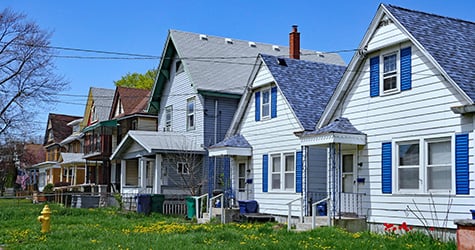
In partnership with DOE's Office of State and Community Energy Programs, NREL assisted Tribes and states in developing programs to issue Inflation Reduction Act-funded Home Efficiency Rebates and Home Electrification and Appliance Rebates.
NREL assisted states with projections of consumer energy and cost savings and provided approval of building energy modeling software to be used in the programs. NREL assisted Tribes with application support and program design. In total, researchers provided direct technical assistance to 13 states and assisted with six webinars to answer questions from Tribes.
Tribal Clean Energy Capacity Building
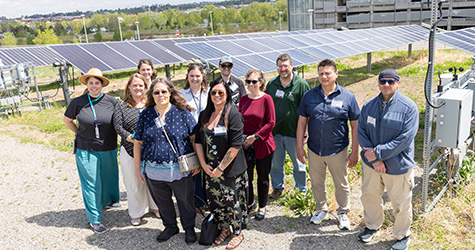
In partnership with the Midwest Tribal Energy Resources Association, NREL hosted a 2-day workshop in May for nine Tribal members to learn how to use the REopt web tool for modeling solar and solar-plus-storage projects. The workshop covered project development, the Inflation Reduction Act, ownership structures, fleet electrification, bifacial and vertical solar, and funding opportunities for Tribes.
NREL has partnered with Tribes for decades providing resources for capacity building, data for informed decision making, and direct technical assistance to support their self-defined energy goals and sovereignty.
Tribal Nation Transmission Program
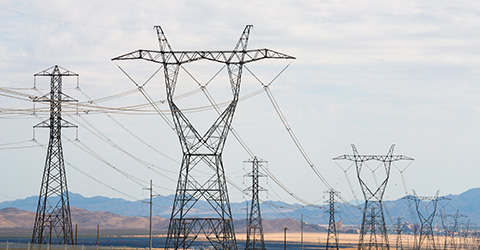
NREL provided technical assistance through the Tribal Nation Transmission Program. Developed with Tribal input to DOE, this program supports federally recognized American Indian and Alaska Native Tribes and Villages with their energy transmission projects through educational resources, training, and expert support from NREL. It also provides funding to aid Tribal participation in key transmission events.
Weatherization Technical Support
NREL's weatherization team provided technical assistance and research to support DOE's Weatherization Assistance Program to help improve accessibility, support innovation, and expand workforce development for home energy professionals. In FY 2024, NREL helped develop several valuable resources to support quality work and a skilled, credentialed workforce.
Prizes
Energizing Rural Communities Prize
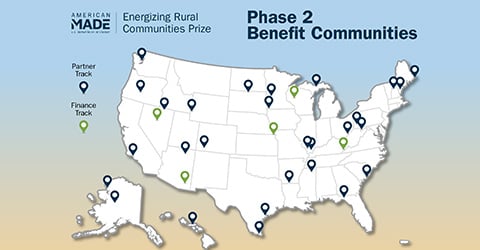
NREL is administering the $15 million Energizing Rural Communities Prize on behalf of DOE's Office of Clean Energy Demonstrations' Energy Improvements in Rural or Remote Areas program. In FY 2024, NREL provided in-kind mentorship to support implementation of the 67 phase-one winners' innovative partnership and finance plans ahead of the phase-two submission deadline in July 2024. Technical assistance activities included more than 25 webinars on a range of topics such as community engagement, project finance, and workforce development.
In September 2024, the Office of Clean Energy Demonstrations announced the 33 winners of the second phase of the prize. Each phase-two prize winner received $200,000 for their partnership plans or innovative financing strategies to help rural and remote communities improve their energy systems and advance clean energy demonstration projects.
Energy and Food Sovereignty Nexus Prize

Launched in September 2024, NREL is administering the TCU Energy and Food Sovereignty Nexus Prize, with $4.1 million available in potential awards for teams from Tribal Colleges and Universities. The prize encourages student teams to develop and implement demonstration projects related to the intersection of energy and food sovereignty on Tribal lands. NREL is also contracting Power Connectors to provide support to teams, including webinars, virtual training, and one-on-one support.
Tools and Resources
REopt for Resilience Course
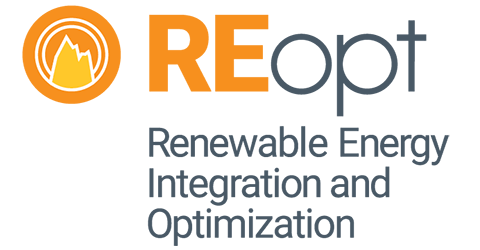
In response to the increasing frequency of extreme weather events such as heat waves, hurricanes, and flooding, NREL developed a free online course to support states, local governments, and other organizations in enhancing their energy resilience. This six-part course provides practical training on the use of the REopt web tool, guiding participants through essential topics to withstand power disruptions, including the prioritization of critical facilities, interpretation of utility bills, and setting of energy goals.
State and Local Planning for Energy Platform Adds Air Quality and Greenhouse Gas Emissions Data
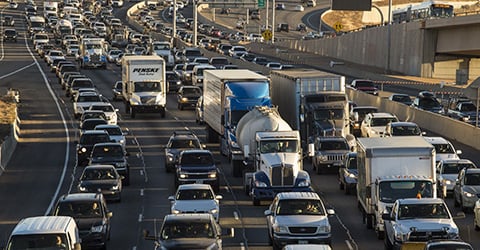
The State and Local Planning for Energy (SLOPE) Platform expanded support of community decarbonization efforts by adding data on greenhouse gas emissions and air quality. SLOPE's citywide estimated greenhouse gas emissions inventory can help energy planners understand sources of emissions and move quickly toward emissions reduction. SLOPE also integrated new air quality data, allowing users to model air quality in various scenarios through 2050 and better understand how different clean energy transition approaches can reduce pollution in their communities.
Utility Bill Impact Dashboard Launches
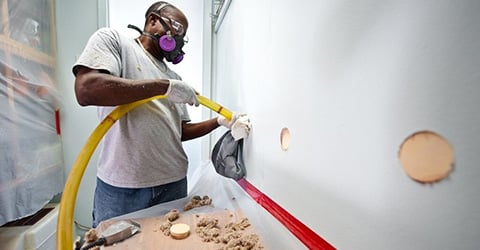
Launched in 2024, the Utility Bill Impact Dashboard equips homeowners and policymakers with data to assess the financial impacts of energy efficiency and electrification technologies. Powered by NREL's ResStock modeling tool, the dashboard projects potential utility bill changes across various climate zones and state-specific conditions and includes Inflation Reduction Act impacts.
Partnerships and Collaborations
NREL continues to deepen relationships across the national laboratory complex as well as with local and regional groups that directly support the implementation of energy transitions.
By working together, NREL aims to deliver a full range of capabilities and "systems-thinking" solutions to address the most challenging issues in energy transition at the subnational scale.
Energy Efficiency and Renewable Energy
Energy Transitions Initiative
Fossil Energy and Carbon Management
Geothermal Technologies Office
Hydrogen and Fuel Cell Technologies Office
Office of Clean Energy Demonstrations
Office of Economic Impact and Diversity
Office of Indian Energy Policy and Programs
Office of State and Community Energy Programs
Solar Energy Technologies Office
The following national laboratories directly contributed to the programs and projects in this report. Learn more about DOE national laboratories.
Lawrence Berkeley National Laboratory
Share
Last Updated Sept. 3, 2025


